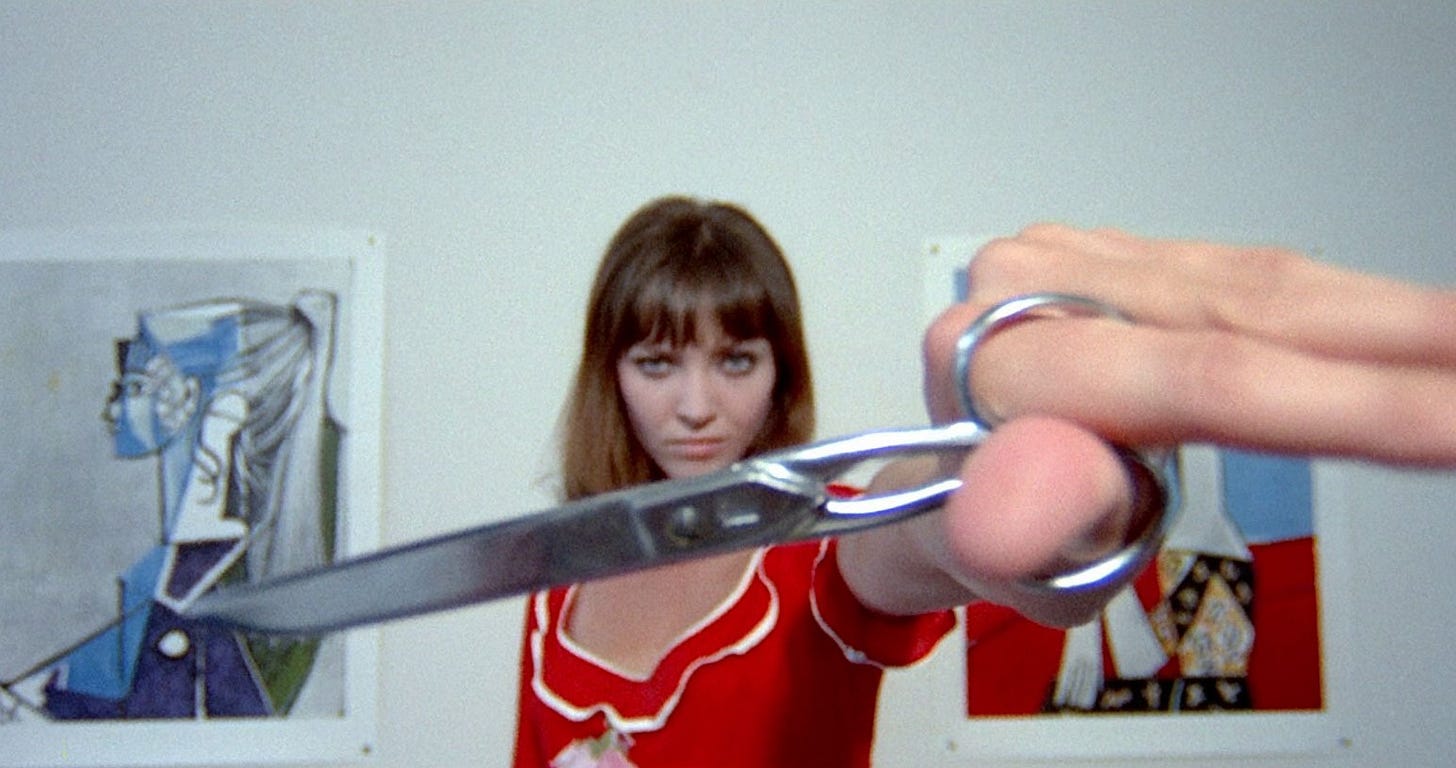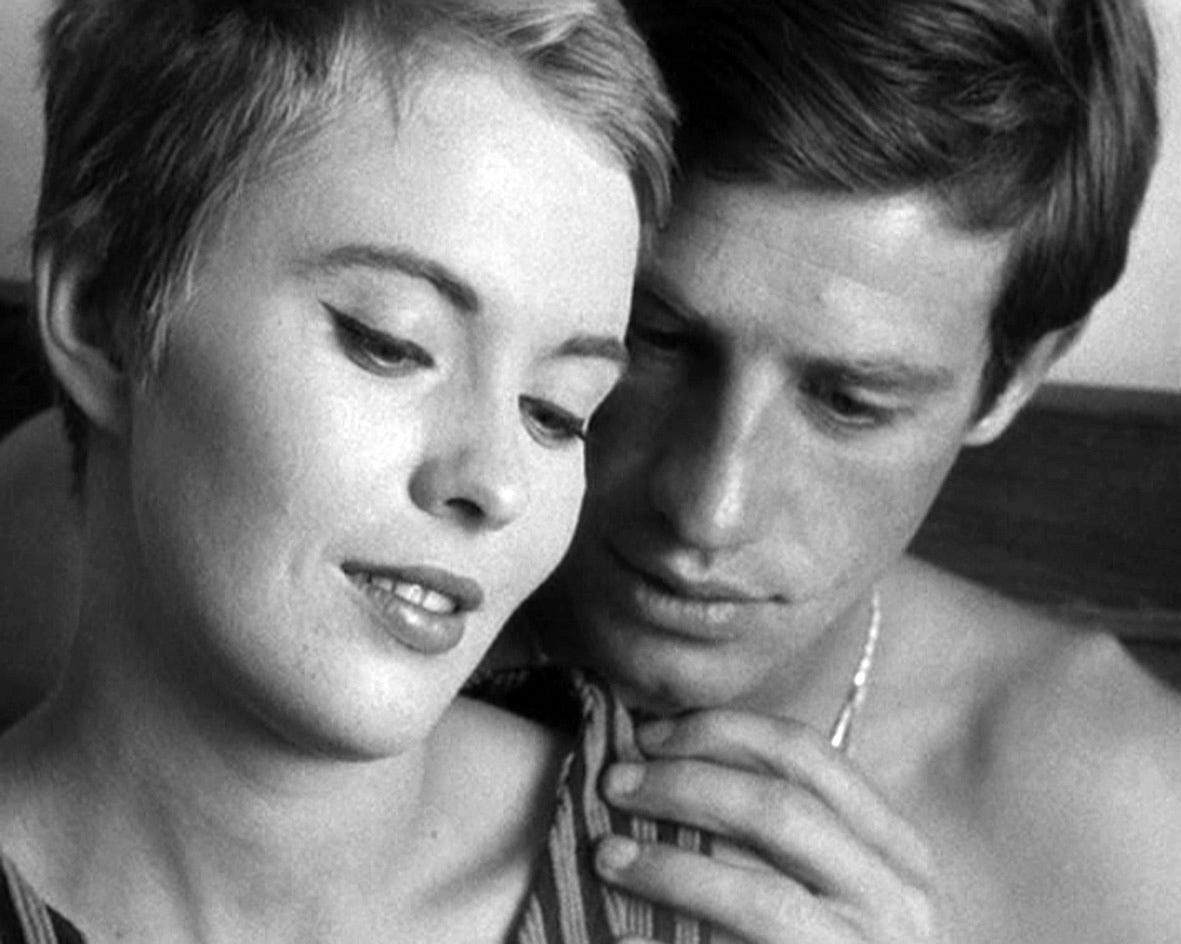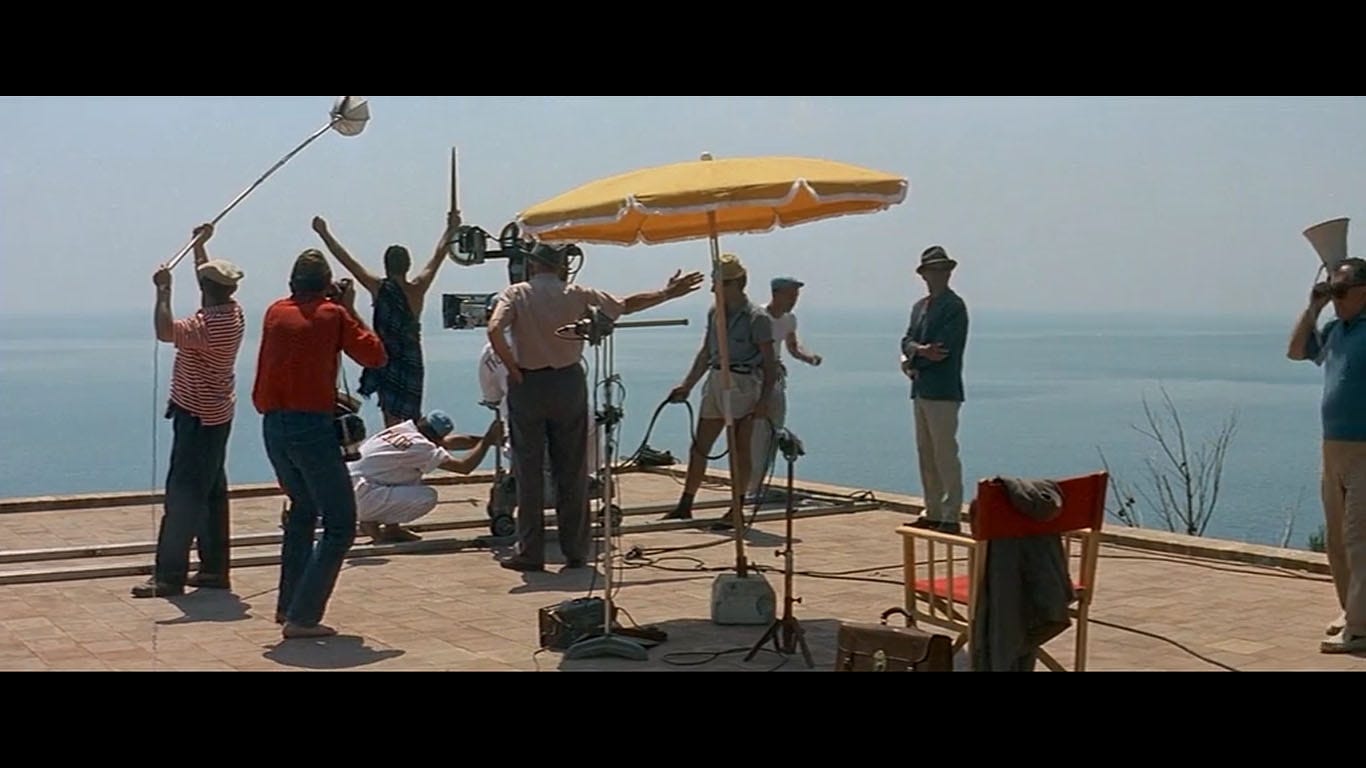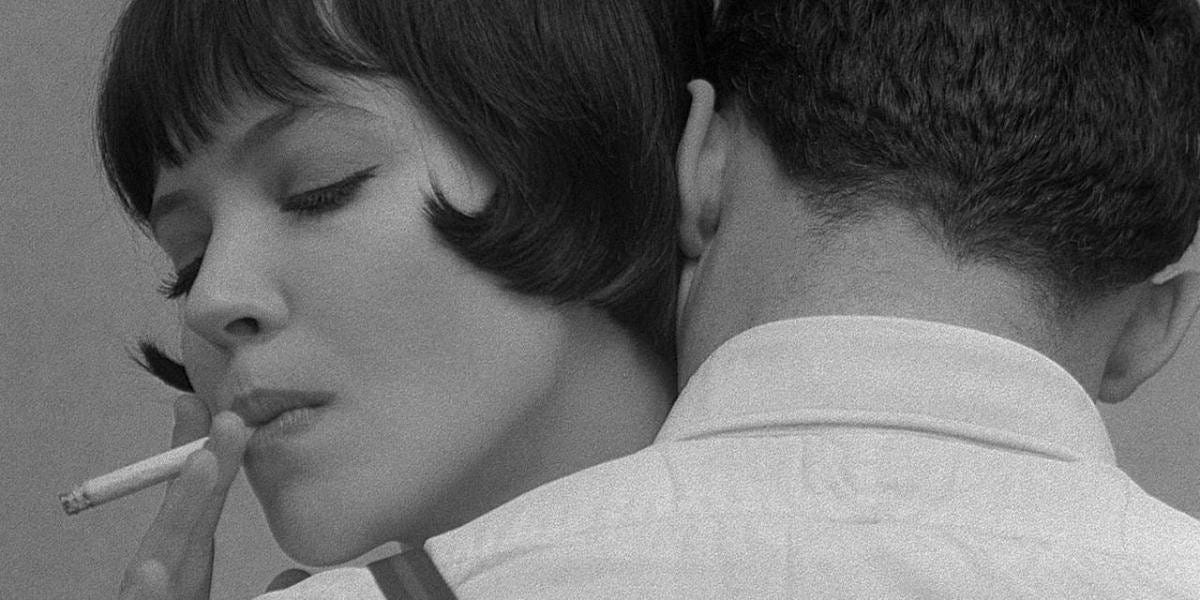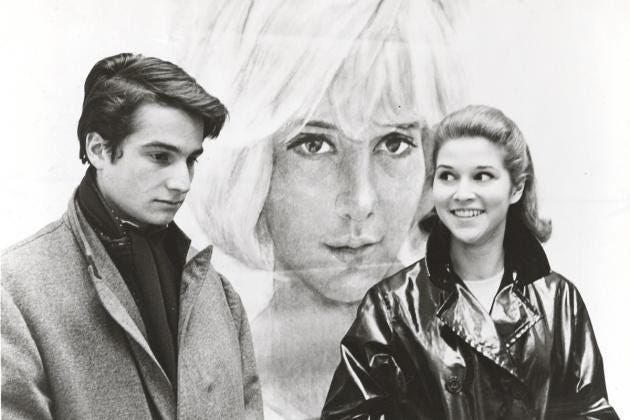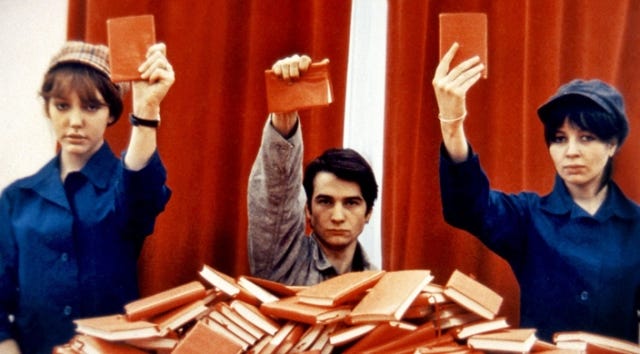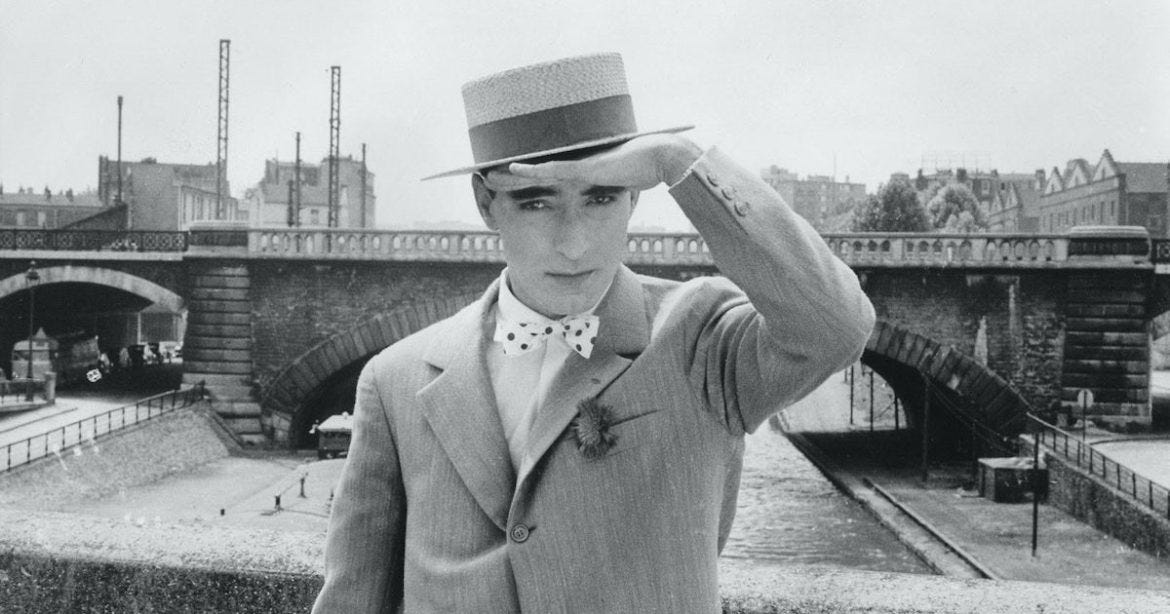
Jean-Luc Godard believed in montage. In perhaps his best-known article, “Montage, my fine care,” which appeared in Cahiers du Cinéma in 1956, he argued in defence of Eisensteinian principles and against the cult of the long take promoted by Cahiers’s co-founder André Bazin. His films, beginning with Breathless in 1960 and ending as far as we know with The Image Book in 2018, emphasised rupture and discontinuity: the jump cut, the super-imposition, the inter-title. By way of tribute, and because there were by the end so many things – yes, yes, more than two or three – to know about Godard, I have assembled some of my favourite statements made by and about the director over the past seventy years. He was a beautiful, maddening one-off. (Words are JLG unless otherwise stated.)
Anna Karina in Pierrot le Fou (1965)
“Defence and Illustration of Classical Construction,” 1952
“I would like to contend with those who seek to lay down absolute rules.”
Truffaut, recalling JLG c.1950
“he was capable of going to see fifteen minutes of five different films in the same afternoon.”
On a Hollywood producer
“Thalberg was a genius… he was the only one that was able to think at 30 pictures a day.”
On frame rates, inter-title from Le Petit Soldat, 1960) “Photography is truth. And the cinema is truth 24 times per second.
Paul Mayersberg, critic (later screenwriter), on JLG on frame rates
“not as flippant as it might sound.”
Bernardo Bertolucci, in “Versus Godard,” 1967
“Godard must be a great devourer of newsprint.”
Kael, recalling Godard’s 1960s films, in 2000
“all of his movies were like very quick skits.”
Peter Harcourt, Six European Directors (‘fun’ game: guess the other five), 1974
“An entomologist by training with a Swiss Calvinist background, Godard looks at life from a certain distance, making notes, suggesting juxtapositions… but he remains unable to effect a helpful synthesis.”
Kael, 1966
“we regret that Godard is not the kind of artist who can provide an intellectual structure commensurate with the brilliance of his style and the quality of his details.”
Fredric Jameson, 1991
“It is no longer certain… that the heavily charged and monitory juxtapositions in a Godard film – an advertising image, a printed slogan, newsreels, an interview with a philosopher, and the gestus of this or that fictive character – will be put back together by the spectator in the form of a message, let alone the right message.”
Gilberto Perez, 1990
“A Godard film gives the impression not of the complete but of the ongoing.”
Franju: “Do you not agree that films need to have a beginning, a middle, and an end?”
JLG: “Yes they do, but not in that order.”
On watching Ridley Scott’s Striptease, 1997
“there was no beginning, no middle, and no end. So I always wonder why people say a story has to be that way, especially to me.”
Godard and Truffaut
On a younger colleague’s breakthrough, 1959
“With Les Quatre cents coups, François Truffaut enters both modern cinema and the classrooms of our childhood.”
On a younger colleague when no longer alive:
“I thought – and I still think – that François was not a good director.”
On the younger colleague once more:
“No one can deny him his rightful place in film history.”
Maybe apocryphal
“All great movies are successful for the wrong reasons.”
G. Cabrera Infante, writing as G. Cain
“A Bout de Souffle is, for its part, the least academic example of an art that by being art now has its established academia.”
On his own breakthrough, 1960
“the first cut of Breathless was two and a half hours and the producer said, “You have to cut out one hour.”’
Bernard in The Squid and the Whale (2005), set in 1986, recalling a trip to A Bout de Souffle
“We saw it at the Thalia with the Dicksteins… You thought the jump-cuts were –”
Woody Allen, on the ‘Godardian’ jump cuts in Husbands and Wives (1992)
“It’s very hard to say whether it just would have been something that came over me one day.”
Godard, on the ‘Godardian’ jump cuts in All the King’s Men (1949)
“I found out I wasn’t the first director to do that. The same process was described in the memoir of Robert Parrish.”
A Bout de Souffle (Breathless), 1960
Peter Wollen, recalling Godard’s start, in 1998
“he seemed unlikely to develop into a respected master of the art film, a pillar of the new French cinema… If anything, he seemed more likely to become a new Cocteau.”
A S Hamrah, 2020
“Like Cocteau and Barthes and Wollen, Godard deconstructed the movies, shaping them into new forms.”
Oliver Stone, 2020
“What Sergei Eisenstein had done for silent films, Godard was doing with modern cinema.”
Michael Wood, revisiting Godard’s early films, 2003
“we seem to be going back in time and seeing the youth of the cinema… Godard gave us back the adventure of finding a world on film, the sense of looking at familiar things as if we had never seen them.”
Angela Carter, on the 1960s
“My whole experience of the next decade can be logged in relation to Godard’s movies.”
Le Mépris (1963)
Robin Wood, 1966
“Godard’s films abound in cultural references, and they are remarkably wide-ranging. Even in A Bout de Souffle… there are visual, aural or verbal references to Bach, Brahms, Chopin and Mozart; Renoir, Picasso and Klee; Shakespeare, Cocteau, William Faulkner, Rilke… Humphrey Bogart, Robert Aldrich, Budd Boetticher, Cahiers du Cinéma; and doubtless several more I’ve overlooked.”
Susan Sontag, 1968
“From cultural appetite on this scale comes the creation of work that is on the order of a subjective compendium: casually encyclopedic, anthologizing, formally and thematically eclectic, and marked by a rapid turnover of styles and forms.”
The director Samuel Fuller, wearing shades and a necktie, brandishing a cigar, in Pierrot Le Fou, 1965
“Cinema is like a battleground. Love, Hate, Action, Violence, and Death. In one word, Emotion.”
Peter Wollen, on Penelope Houston’s The Contemporary Cinema, 1963
“She actually embarks on an analysis of Godard’s A Bout de Souffle, without mentioning Samuel Fuller.”
On Nicholas Ray’s Hot Blood, February 1957
“If the cinema no longer existed, Nicholas Ray alone gives the impression of being capable of reinventing it, and what is more, of wanting to.”
Ferdinand in Pierrot le Fou, on the maid’s outing to Ray’s Johnny Guitar
“it’s good she's getting the right education.”
The critic David Thomson, recalling his early-60s aspirations as a film-maker
“the model of what I was trying to make was those French films… particularly the way that Godard was doing a pastiche of American genres but hurling them into the new age.”
Vivre sa Vie, 1962
Bertolucci, on Godard’s scrambling of film chronology
“the thing that’s touched me most in recent years was seeing Dreyer’s Joan of Arc after seeing Godard’s Vivre sa vie. It was weird but I felt that Dreyer owed something to Godard.”
Susan Sontag, reviewing Vivre sa Vie, 1964
“Godard is in my opinion the most important director to have emerged in the last ten years.”
Gilberto Perez, on Anna Karina, the star of Vivre sa Vie, among other films
“an emblem of the soul, a signifier of tenderness, a concrete manifestation of unsuppressible beauty and humanity.”
On why people didn’t like Les Carabiniers (1963)
“it is an honest film about war”
Manny Farber, Les Carabiniers
“visually ravishing at any moment, but nearly splits your skull”
Kael on the first hour of Les Carabiniers
“hell”
V F Perkins, at the end of Film as Film (1972)
“The degree to which Les Carabiniers is to be valued will have to be argued in terms other than those proposed here.”
Martin Scorsese, in 2014, on his favourite Godard film, a source of allusion – the central relationship, the Delerue score, in Casino (1995)
“a shattering portrait of a marriage… a lament for a kind of cinema that was disappearing… a profound cinematic encounter with eternity… one of the most frightening great films ever made.”
Kael, on Bande à part
“like a reverie of a gangster movie as students in an expresso bar might remember it or plan it—a mixture of the gangster film virtues (loyalty, daring) with innocence, amorality, lack of equilibrium.”
James Ellroy, on Bande à part, 2019
“The mastermind criminals are stupid kids who live at the house of one of their moms.”
Manny Farber, 1968
“Had he done nothing else, Godard should be remembered for having invented an army of graceful, clumsy, feeble oddballs.”
Peter Harcourt, 1974
“Godard seems trapped in the uncertainty of an adolescent self-consciousness.”
Tobi Haslett, 2016
“For as long as anyone can remember he’s been the stroppy malcontent.”
Not paint, but blue: Godard collaborating with Belmondo
David Thomson, on Pierrot le Fou, 2002
“Pierrot le Fou is an American film noir, shot in the sunny countryside of Renoir, re-edited by a Soviet montage maniac and then presented as a lecture about itself.”
Oliver Stone, recalling Pierrot le Fou, 2020
“he could montage eight or ten shots of a burning match, a gun, a drunk American cowboy, a French chick wearing a Vietnamese rice hat, a Viet Cong flag, this, that, and a voice-over with American artillery sound effects, and you could take a metaphorical leap into Vietnam — it was stunning.”
Chantal Akerman, on Pierrot le Fou, 2009
“I felt like it was talking to me. It was poetry… I walked out of the cinema thinking, ‘I want to make films too.’”
On the profusion of blood in Pierrot le Fou
“Not blood, red.”
John Willett, on French culture in the 1960s
“there is no new figure whose impact is comparable to that of Jean-Luc Godard in the cinema.”
Inter-title, Masculine Feminine, 1966
“This film could be called the children of Marx and Coca-Cola.”
Kael, on Masculine Feminine, 1966
“Godard has liberated his feeling for modern youth from the American gangster-movie framework which limited his expressiveness and his relevance to the non-movie centered world… Godard has, at last, created the form he needed. It is a combination of essay, journalistic sketches, news and portraiture, love lyric and satire.”
Paul Schrader, fellow Calvinist, 1990
“Masculine Feminine was the film that really turned me around and seemed to be everything a film could be. It was personal and political and original and sexy; it was a film of my generation… Breathless wasn’t really our film so much.”
Kael, on the film’s definition of the “romantic problem”
“The boy says, what’s in ‘masculine’—mask and ass, what’s in ‘feminine’—nothing. And that’s what defeats him. Worse than losing a love is holding it in your arms and not finding it.”
Jean-Pierre Léaud and Catherine-Isabelle Duport in M/F (1966)
Peter Wollen, 1966
“Another recurrent feature of Godard’s attitude to women is that they are traitors.”
Laura Mulvey and Colin MacCabe, 1980
“More than any other single film-maker Godard has shown up the exploitation of woman as an image in consumer society.”
Serge Daney, 1976
“Godard’s strange feminism…”
Peter Wollen, noting Godard’s politics, soon to define his work
“Godard is radically dissatisfied with society.”
La Chinoise (1967)
Jonathan Rosenbaum, responding to the New York Times coverage of Godard’s films around the time of La Chinoise, 1967
“it is irresponsible to call them frivolous; far more frivolous is the critical intelligence which refuses to grapple with them.”
Kael, on general coverage
“Reviewers often complain that they can’t take him seriously. When you consider what they do manage to take seriously, this is not a serious objection.”
Paul Schrader, on Kael’s rearguard action
“I remember her calling up and saying that we have to get behind La Chinoise… Godard was the guy you went to the barricades for.”
Bertolucci, on JLG’s agonising influence
“For one of Godard’s shots I would have done anything. It was a question of life and death.”
Bertolucci, on giving a certain phone number, address, political programme, and a pair of spectacles to an assassination target. . .
“The Conformist is a story about me and Godard.”
Don DeLillo, on how, after one viewing and two sittings, he turned Weekend into his short story ‘The Uniforms,’ 1973
“Took out the boring parts. Added a few brand names.”
Manny Farber, 1968
“At the end of this director’s career, there will probably be a hundred films, each one a bizarrely different species, with its own excruciatingly singular skeleton, tendons, plumage.
JLG, from the end credits of Weekend
“Fin … du Cinéma”
Rosenbaum, on what came next
“… his embattled “Dziga Vertov Group” period (roughly 1968-72)”
Schrader, Cinema, 1971
“when Godard is drifting away into rhetoric…”
Truffaut, 1973
“I will not co-produce your film.”
Claire Denis, on JLG and Gordon’s Tout Va Bien (1972)
“It’s great.”
Yves Montand and Jane Fonda, in Tout va Bien (1972)
Kael, 1980, on Every Man for Himself (also known as Slow Motion and Sauve Qui Peut (la vie) and the return to narrative of a director who had burned away the fat of conventional moviemaking
“More than the fat has been burned out of Every Man for Himself: the juice is gone, too.”
Peter Harcourt, 1981, on Every Man for Himself
“The film is baffling.”
JLG, alleging the kind of thing he was up to, in 1980
“I’m doing A True Story of the Movies, which some Dutch people are financing.”
Rosenbaum, curious in 1980 about whether JLG has had any exposure to the Rocky Horror Picture Show cult.
JLG: “No.”
Wim Wenders, recalling Godard’s video years, 1982
“You have to learn from what happened to him.”
JLG, reformed Maoist, 1994
“I never read Marx.”
Paul Schrader, on the sex scene in American Gigolo
“actually Godardian; all the images in it are from Two or Three Things I Know About Her.”
Cheers, “The Motion Picture,” 1987 on Diane’s fledgling efforts as a director
Diane: “Are you sure my film had no effect on your father? …”
Woody “he thought it was too derivative of Godard.”
Woody Allen, on appearing in Godard’s King Lear (1987)
“I felt while I was doing it, this is going to be a very silly movie… I never saw it.”
Schrader, 1990
“for the last twenty years he’s been talking to an empty room.”
Bertolucci on JLG’s recent work, 1990s
“it doesn’t need light from the sun… it’s sublime and far away.”
The populist verdict on Nouvelle Vague (1990)
Vincent Canby, New York Times: “The party’s over.”
Andrew Sarris: “I liked Nouvelle Vague very much.”
JLG: “Yes, that came out very much the way I wanted.”
Jacques Rivette, 1998
“Definitely Jean-Luc’s most beautiful film of the last 15 years.”
Nouvelle Vague (1990)
Gilberto Perez, looking back on late Godard, 2004
“His real new beginning, and for me his best work since Deux ou trois choses que je sais d’elle (1967)…”
Armond White, choosing the ten best films ever made in 2012
“looms in my memory as his grandest work.”
Reminding Hal Hartley of the setback that befell Amateur (1994)
JLG: Is this the one that was not taken in Cannes this year?
HH: It was in the Director’s Fortnight.
JLG: Is it the one refused by Gilles Jacob?
HH: I guess.
On American imperialism and For Ever Mozart, 1997
Al Milgram: Why was there no criticism of the Bosnian war at all in the film like you had in the Vietnam-era films with the U.S. in Vietnam?
JLG: Because the movie has nothing to do with the Bosnian war.
Jonathan Rosenbaum, 2012
“The limitation to be found in practically all of Godard’s work ever since he moved back to rural Switzerland is that of self-imposed isolation.’”
Rosenbaum, asking why JLG no longer lives in the city, 1997
JLG: Too noisy, too dirty, no water, no lake…terrible.
Godard, on the span of film history, late 90s
“Film begins with DW Griffith and ends with Abbas Kiarostami.”
Kiarostami, on Godard’s assessment, 2005
“in every interview now, with no provocation, he makes a sly comment about me, so I don't think he believes that statement any more.”
Rachel Kushner, on Film Socialisme (2011)
“has gambling and a brunch buffet, frantic disco, the banter of history, vanished gold, Palestine.”
Tobi Haslett, on The Image Book, 2019
“Freed from the rigors of dialectics by the failure of the New Left, Godard now stalks Lear-like over the heath of his own devastated feelings.”
On his legacy, 1994
“I haven’t started thinking about that.”
Jane Campion, 2008
“There has never been a more daring conceptual, chic, and irreverent filmmaker.”
Brian de Palma, mid-90s
“Godard is incredibly brilliant, the things he says.”
Schrader, 2018
“Godard said a lot of shit. About 10 percent of it is right, but the 10 percent that’s right is quite right.”
Agnes Varda, on JLG, 2018
“A rat.”
Jagger, at some point in the fifty-four years since One Plus One went kerplooey
“A twat.”
Truffaut, 1973
“A shit.”
Guy Debord, late 1960s
“the most cretinous of them all”
JLG, on Orson Welles, 1963
“All of us will always owe him everything.”



